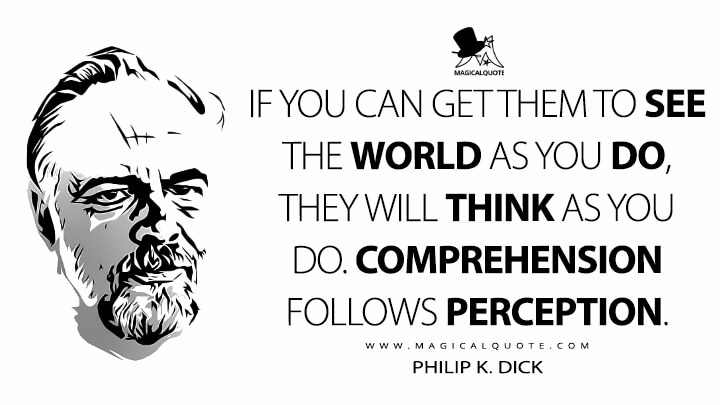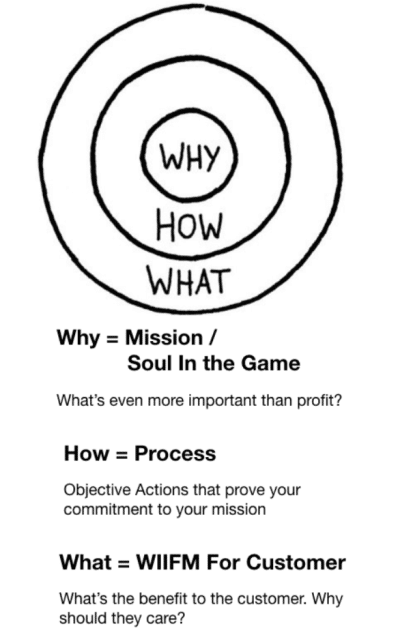
It’s not what you make. It’s what you keep.
Every business owner wants growth from their advertising, but growth at the expense of margin will never do.
Good branding campaigns should not only grow market share, but also allow you to grow margins.
This is where the Philip K. Dick quote comes in.
“If you can get them to see the world as you do, they will think as you do.”
Because doing business with people who value how you do what you do is the key to higher margins.
Makes sense, right?
If you sell to customers who view you as a commodity, you’ll get commodity pricing.
Sell to people who see you as their first and best choice, and your premium pricing will be gladly accepted as “reassuringly expensive.”
 The challenge, then, is to convince people to see your world as you do.
The challenge, then, is to convince people to see your world as you do.
Now, getting an audience to view the whole of life as you do ain’t possible with a branding campaign.
Fortunately, that’s not the goal.
The goal is to attract an audience that already views life pretty much as you do.
Your ads will then persuade that audience to see — not the whole world — but your industry or profession in the same light as you see it.
Your Advocated Position
How you see your profession is what I call your “advocated position.”
And, yes, if you have “soul in the game,” then you have an advocated position.
 To be clear, your advocated position will involve technical or action-based elements, but those elements will be there to serve as proof and manifestations of your values-based perspective.
To be clear, your advocated position will involve technical or action-based elements, but those elements will be there to serve as proof and manifestations of your values-based perspective.
This is what Simon Sinek was getting at with his famous “Start With Why” TED talk.
You don’t start with features or benefits. You start with your beliefs and advocated position.
Only then do you use specific actions, features, or benefits as examples of how your beliefs impact the way that you do business.
For example, Apple’s advocated position is that technology should serve people and not the other way around.
So when they make intuitive and easy-to-use-but-powerful products, it is not simply because they believe that will give them an edge in the market, but because that’s an expression of their core philosophy.
This is why various iPhone killers can outcompete Apple on any number of attributes or specs — screen size, resolution, brightness, camera, battery power, etc. — and still fail in the marketplace compared to much more expensive and high-margin iPhones.
Apple concentrates on the overall user experience and ecosystem while attracting customers who value that.
This is how Apple takes 75% of the smartphone profits with a measly 13% market share.
Again, if you sell to customers who view you as a commodity, you’ll get commodity pricing.
But sell to people who see you as their safest and best choice, and your premium pricing will be gladly accepted as “reassuringly expensive.”
Comprehension Follows Perception
Here’s the catch: the theory of elevating messaging to raise margins is quite simple, but the execution is not.
Plainly stating your advocated position in your ads won’t cut it.
Most people won’t believe such a statement, even when offered “proof.”
In order to believe you, the audience has to feel as if they know you and your backstory — that they know why you have an emotional compulsion around your stated values.
They have to perceive you as a character they can trust before they can follow along with your advocated position.
And even then, it is better if your advocated position is presented thematically, and in dramatized form.
Because, “comprehension follows perception.”
Hence the importance of Origin Stories.
Origin Stories present you to the audience as a character to be perceived, with a story that’s easily understood, and motives that can be trusted.
It’s not about simply “telling your story.” It’s about telling your story in a way that helps people see the world as you do.
That’s the key to higher margins.
Because it’s not what you make. It’s what you keep.
So if you want to make more AND keep more, ensure you’re working with an ad team equal to that challenge.
- Getting a Foot in the Door — Of Perception - November 27, 2025
- What Digital Superstars Know About Offline Advertising - November 17, 2025
- Unmistakable: A Tale of Two Boots and Branding Done Right - November 8, 2025
